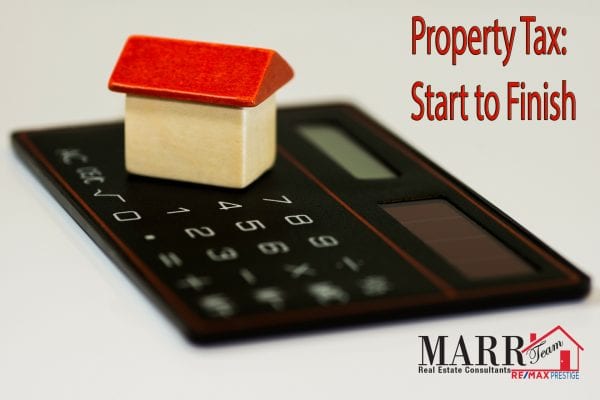All about Property Taxes!
 We are frequently asked many questions when it comes to property taxes as many homeowners simply want to understand the basics of Texas property taxes when purchasing a home. With the start of the new year, we wanted to take the time to help answer some of these questions for you and take the process from start to finish to give you all the details!
We are frequently asked many questions when it comes to property taxes as many homeowners simply want to understand the basics of Texas property taxes when purchasing a home. With the start of the new year, we wanted to take the time to help answer some of these questions for you and take the process from start to finish to give you all the details!
Why are Texas property taxes so high compared to other states?
Many homeowners, especially those relocating from another state, notice that the property taxes are higher on homes here than in many other states. The biggest reason is that Texas does not charge state income tax, which is good news for families looking for a place to relocate. However, this tax-free status for citizens is also probably why, in order to meet revenue targets, the local government relies heavily on property taxes instead. Unfortunately, this means Texas is then in the top 10 of a list of states with the highest property taxes, according to rankings by credit scoring company, WalletHub. With an effective real estate tax rate of 1.93%, Texas ranks fifth place out of 51 other states in America. Although in visiting with our clients that have relocated to the area those taxes go to fund great schools, roads and infastructures that we enjoy on a daily basis and are bringing many to the state.
Who determines how much taxes property homeowners should pay? And how does that process work?
Your local county appraisal district (or CAD) managed by a chief appraiser, is in charge of determining the value of your home- that is, appraising, the properties within the CAD’s designated county.
As per the Texas Comptroller; with few exceptions, Tax Code Section 23.01 requires taxable property to be appraised at market value as of January 1st of that year. As Texas is a non-disclosure state even the CAD is not given the amount paid by buyers on their home purchases. During the appraisal phase of the year they must gather market information (more and more is available online), permit information and drive by properties throughout the year updating information and the condition of the home. After you purchase a home the CAD will send a survey asking you the details of your home purchase as well. (Note: you are not required to provide the information to them)
A Notice of Appraised Value is mailed to each homeowner every year in April which informs the property owner of the appraisal district’s value of a property. This detailed notice contains the description of the property; taxing units allowed to tax the property; preceding year’s appraised value; preceding year’s taxable value; current year’s appraised value; last year and current year exemptions; estimate of taxes based on previous year’s tax rates if the appraised value is greater in the current year; statutory language; explanation of how to protest; ARB hearing information; and an explanation that the appraisal district only determines a property’s value and does not decide on tax increases. Finally, the taxable value set on a property based on its appraisal, plus the tax rate determined by the taxing units, combined, will determine the total amount of taxes that property owners must pay. The Notice of Appraised Value uses the previous year tax rates in the estimates of your taxes for the year, but the taxing entities (city, county, school districts, etc…) do not officially set the years tax rates until the fall after they have received information from the CAD on their total tax roll/valuations for the district.
If you believe the valuation of your property is too high, you have the opportunity to protest it once you have received your Notice of Appraised Value. We will provide additional information on a future blog with detailed information on protesting your taxes.
Tax Calendar Phases per the Texas Comptrollers Office:
- Appraisal Phase (Jan. 1 through May 15)
Jan. 1 – April 30 Property is appraised and exemption applications are processed.
April – May 1 Notices of appraised value are sent.
May 15 Appraisal record prepared and submitted to the ARB. - Equalization Phase (May 15 through July 25)
May 15 – July 20 Protests and challenges are heard and determined.
July 20 Appraisal records are approved.
July 25 Appraisal roll is certified. - Assessment Phase (July 25 through Oct. 1)
July 25 Appraisal roll received by taxing units.
July 25 – Sept. 30 Tax rates are adopted by taxing entities and taxes are levied (calculated).
Oct. 1 Tax bills begin to be sent to taxpayers. - Collection Phase (Oct. 1 through Jan. 31)
Oct. 1 – Jan. 31 Current taxes are collected.
Feb. 1 Penalties and interest begin to accrue.
July 1 Additional penalties may be added for legal costs.
How do I file for an exemption?
Exemptions can help homeowners lower their tax bills. A homestead exemption for a primary, owner-occupied residence can net a homeowner thousands in exemptions on the valuation of their home depending on the exemptions available by each taxing entity which in turn lowers your tax bill. So you will definately want to apply for any exemptions as soon as you can.
For homestead exemptions you cannot file until the first year that you own and occupy the home on January 1st. When you purchase your home companies will send you mailings offering to file the exemption for you for a fee. This is a free filing so just wait until January the following year and send in the form. Luckily for our clients, the Marr Team sends out homestead exemption forms in January to all of our clients who purchased a home the previous year (along with instructions and a self addressed stamped envelope) to help make this process easier.
Other exemptions that are available include Over 65, Disabled, Surviving Spouse of Armed Forces or First Responder Killed in Duty and Disabled Veteran Homestead. These other exemptions can be filed as soon as they apply to the owner of the property.
How do I pay my property tax bill?
Taxing units mail their tax bills in October and they are due upon receipt with a delinquency date of February 1st. If February 1st is drawing near and you have not received a tax bill, contact your local tax offices. Find out how much tax you owe and make sure your correct name and address are on record. Failure to receive a tax bill does not affect the validity of the tax, penalty or interest due, the delinquency date, the existence of a tax lien or any procedure the taxing unit institutes to collect the tax.
Your tax bill may include taxes for more than one taxing unit if these taxing units have combined their collection operations. Both the property owner and the owner’s designated agent must be mailed tax bills. If your mortgage company pays the property taxes on your home, the mortgage company will receive the tax bill, too, and will then pay this bill directly from your escrow account. Just make sure and watch that they pay the bill by January, otherwise follow up to confirm they have all the information.
I have other questions, who can I contact?
We, The Marr Team, are readily available to answer all questions regarding Texas property taxes! We have tried to provide the basic information covering property taxes from start to finish, but we know every situation is different so if you have other questions we are happy to help answer or direct you to the proper person to get your answers. We hope you find this information regarding Texas property tax basics helpful! Feel free to reach out to us anytime with any questions, we will be happy to help. Remember: knowledge and experience are not expensive they are priceless!
